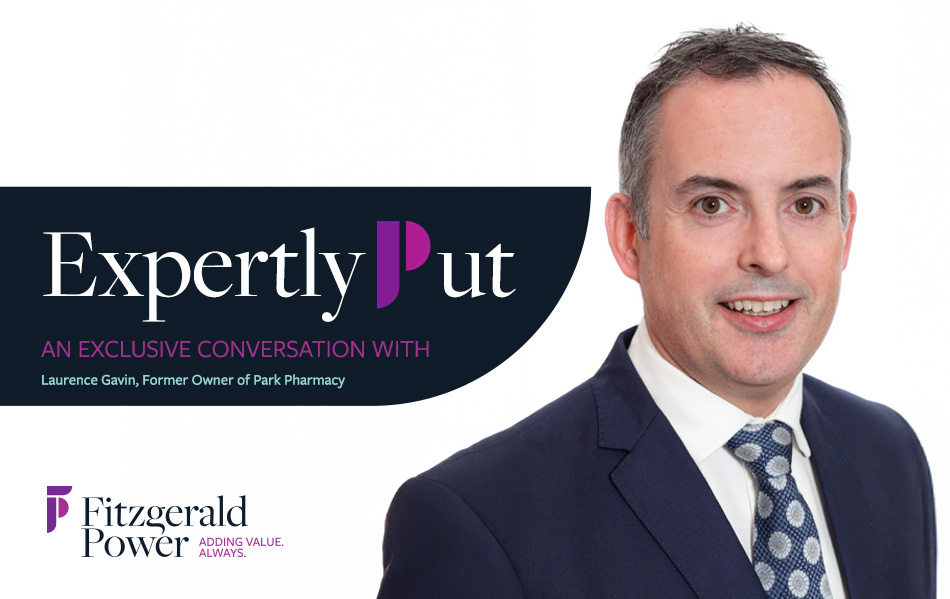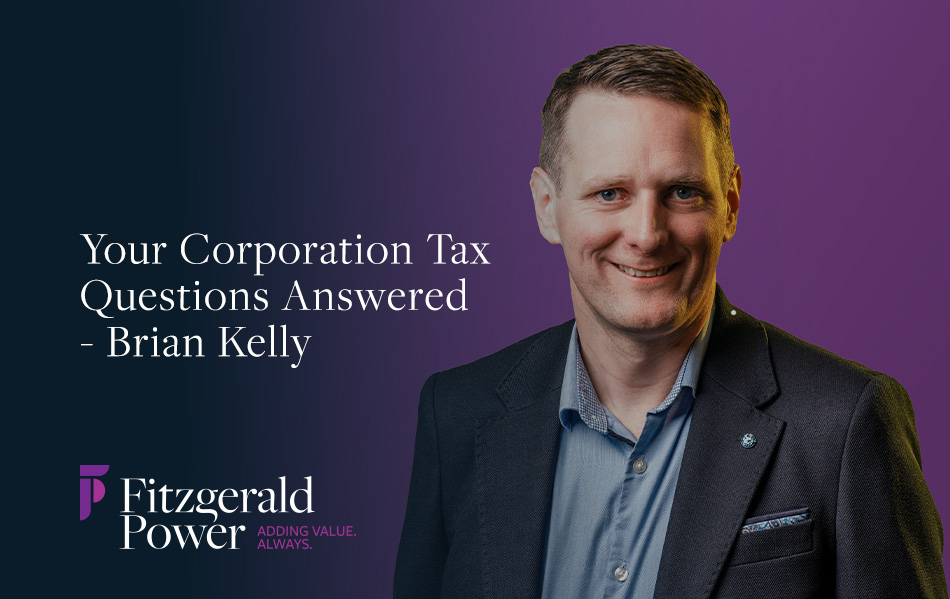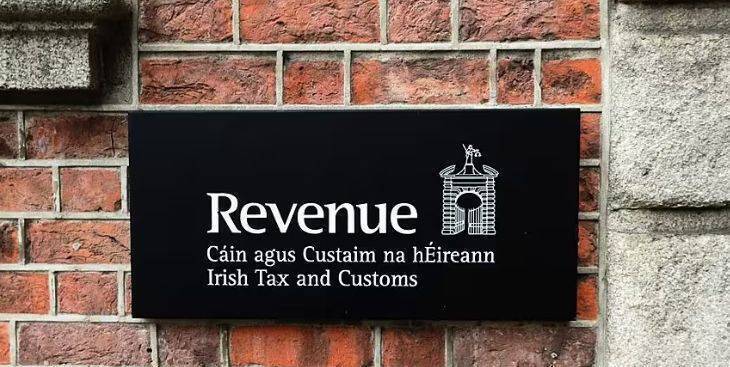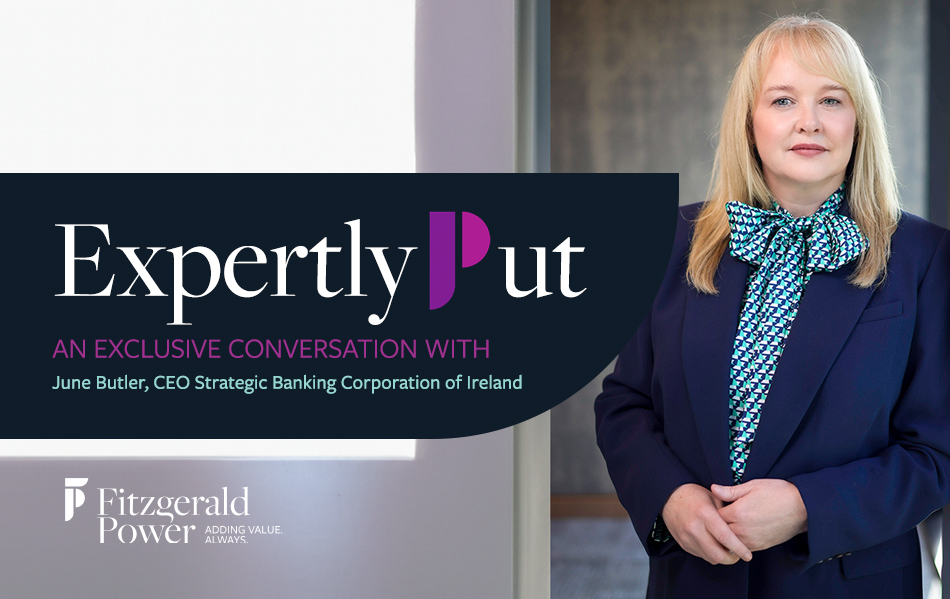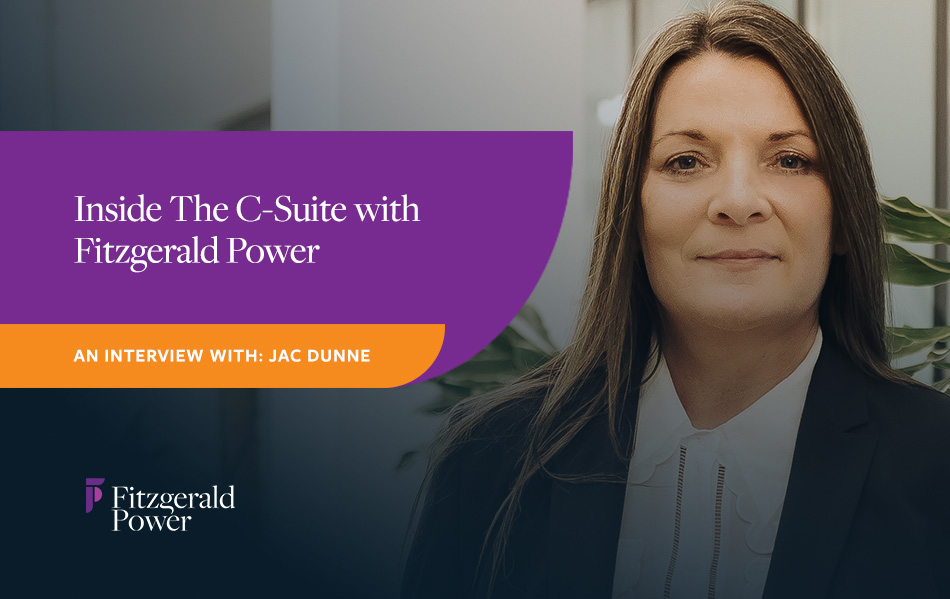Expertly Put is a series of exclusive conversations with industry experts, designed to help business owners and management teams gain a deeper understanding of the topics that matter most. In this edition, Noel Winters sat down with Laurence Gavin of Park Pharmacy to discuss the implications, difficulties and things to consider when looking to sell your pharmacy business.
Deciding to sell your pharmacy business can be a little daunting, particularly if it’s been in the family for a number of years. However, it’s nowhere near impossible, and can regularly be the best decision you’ve ever made. As with most decisions in life, preparation and due diligence are key when it comes to a smooth process. For the rest, we’ve spoken to Laurence Gavin, who recently sold his business, Park Pharmacy, about his experience with the process and to share his insights.
Noel Winters (NW):
Laurence, having recently sold your business, could you take us back to the beginning of your journey into pharmacy ownership? What inspired you to pursue ownership rather than remaining an employee?
Laurence Gavin (LG):
From the outset, my ambition was pretty clear: I wanted to complete my pharmacy degree and ultimately own a retail pharmacy. I grew up on a farm, and from a young age, I was involved in the commercial side, buying and selling livestock. I enjoyed making a profit; I have always enjoyed that commercial aspect of the work. So owning a retail pharmacy business was the perfect blend for me of my professional role as a pharmacist and patient care, and also having that commercial side to my work.
NW:
What do you believe were the key milestones in growing your business?
LG:
I think in the early days, because of the cost of acquisition, you’re very focused on managing debt, which can feel nerve wrecking. However, this is a challenge that time will naturally resolve. I was very focused on costs and keeping them to a minimum was a priority. As the business grows, the challenges evolve, and they can be around adequate staffing levels to support growth in the business and transitioning from managing a smaller team to managing a larger team.
NW:
How has your role evolved over the past 19 years as the business has scaled?
LG:
At the beginning, I felt that I was very engaged with the customer base, and our volumes were lower, allowing for more dedicated time dealing with our patients. As a result of the success and the growth of the business, my time as the owner, manager and supervising pharmacist was consumed by other things. Things like HR and, increasingly over the past 19 years, the heavier regulatory demands. Running a busy community pharmacy now involves a substantial administrative burden, which has snowballed through various arrangements and schemes, resulting in this highly admin-heavy system.
NW:
Let’s discuss the sale of your business and the valuable lessons it offers. I’m keen to learn when you decided to sell and the reasons behind that decision.
LG:
My primary goal was to own and successfully build the pharmacy business. Fortunately, with the support of excellent individuals, including advisors, staff, local professionals, and loyal customers, we achieved that success. Reaching that point felt like I had reached my goal. In the years leading up to the sale, analysing the accounts with you confirmed that I had maximised the business’s potential. I also realised I had reached a plateau; I wasn’t sure how to further grow the business and felt I had taken it as far as I could. Therefore, I felt I had accomplished my objective, and it was time to pursue a new challenge.
NW:
How did you know it was the right time?
LG:
I don’t know if you ever know it’s the right time. And I think it’s important not to become fixated on whether it’s the right time or not. What I did know was that it was a good time for me. I had brought the business to a point that I was happy with it and proud of it, and happy to sell it. And having looked and taken advice, it was a sensible decision for me, both from a commercial and a lifestyle point of view. It’s not all about the numbers.
NW:
How did you find potential buyers, and did they approach you, or what process did you run on it?
LG:
Prior to the sale, we received unsolicited approaches from various parties through letters sent directly to the store. Despite having many such letters over the years, we had not been actively approached by any individual party in person. After deciding to sell and considering the financial and lifestyle implications, I engaged professional advisors. Given our long-standing relationship with Fitzgerald Power, we initiated discussions with you and the team and received clear guidance on navigating the process. This led to a clear path for identifying potential purchasers and the process, and that’s how it transpired.
NW:
Once negotiations conclude, a preferred bidder (or bidders) is selected to proceed with the due diligence process. How was that experience?
LG:
Due diligence was lengthy, comprehensive, and at times, a little frustrating. But the advice from the legal and accountancy professionals was, listen, this deal won’t proceed if any of these issues remain unanswered. So my advice to anyone embarking on it would be just get on board with it. It is long, it can seem tedious, it can seem repetitive, it feels that you may be answering the same questions in many different ways, but it is necessary and it protects the purchaser and the seller in the process, and the seller from any comeback after the sale.
Probably the biggest challenge with the due diligence was having the time pressures of answering the questions and producing documents whilst running a busy retail pharmacy. In running the busy retail pharmacy, I feel you wear many hats; you’re the owner, the manager, the HR person, the pharmacist… You’re a lot of things to a lot of people. And this process, because it’s all carried out in a confidential way, you are taking on another role. You have to do all of this stuff and find time for it on top of your many roles already.
NW:
Thinking back to your initial expectations of the sales process, was there anything that surprised you once you had experienced it firsthand?
LG:
I think most of the pharmacy-related stuff, reporting, accounting, contracts, and agreements, were all pretty much as expected. However, there were a few surprises in some of the property elements of the transaction. I expected that to be more seamless, but when you get into examining title and deeds and the granting of leases, etc., that threw up a few queries that I hadn’t expected.
NW:
With the sale completed , how do you reflect on letting go of the company you built? Describe the day of completion and the week that followed.
LG:
I suppose I always had a very clear view that it was a commercial business and a commercial asset. And I always separated Laurence the pharmacist from the pharmacy business that I was operating. So I viewed it as a commercial asset. And whilst I was, as I said earlier, very proud to get it to where it got to and achieve success in my eyes, I was happy that it was the conclusion of that process. I was opting to sell, choosing to sell and happy to do so. So what did it feel like afterwards? Again, it felt like success. It felt like we had achieved what we set out to achieve.
NW:
What’s life been like after?
LG:
Life has changed for sure. I still very much enjoy my role as a pharmacist, and I’m still active in that role. Pharmacy ownership can be all consuming, it is important to reflect on your role and realise that you don’t have to be in that ownership space.
It has been great to work in that way and to be solely focused on your professional role as a pharmacist without wearing any of the other hats that I mentioned earlier. So it has been really nice from a lifestyle point of view, in that there’s more time for many of the things that we all want more time for: family, friends, recreation.
NW:
Very good. And two questions in one, really… If you were to sell it all over again, what would you do differently? And in the same breath, what advice would you give any business owners who are thinking about selling?
LG:
If we were to do the sale all over again, I would suggest planning further in advance. I only actively engaged in the sale process 12 months before selling, but ideally, I’d suggest engaging 24 months prior to spread the workload. Obtain a due diligence template and understand its requirements. The concept of pre-due diligence seems particularly useful to spread tasks over time. Address any property issues in advance, as I mentioned earlier. Ensuring your financials and accounts are up-to-date is absolutely fundamental. Therefore, preparation and more time are key.
Regarding advice for business owners considering a sale, it’s crucial to operate your business as efficiently as possible in the pre-sale years, as you will only sell it once. Benchmark your position within your sector and identify areas where your EBITDA isn’t optimal. Consult with professionals to discover opportunities for improvement, as this number significantly influences the sales process and should be as strong as possible.
NW:
Thanks Laurence, brilliant advice. And great to chat to you.
LG:
You too. Any time.
We hope you enjoyed the read. Until next time.

